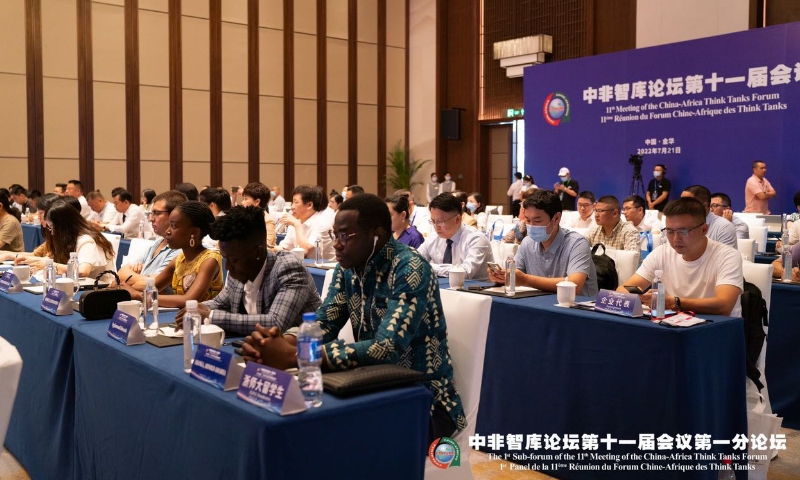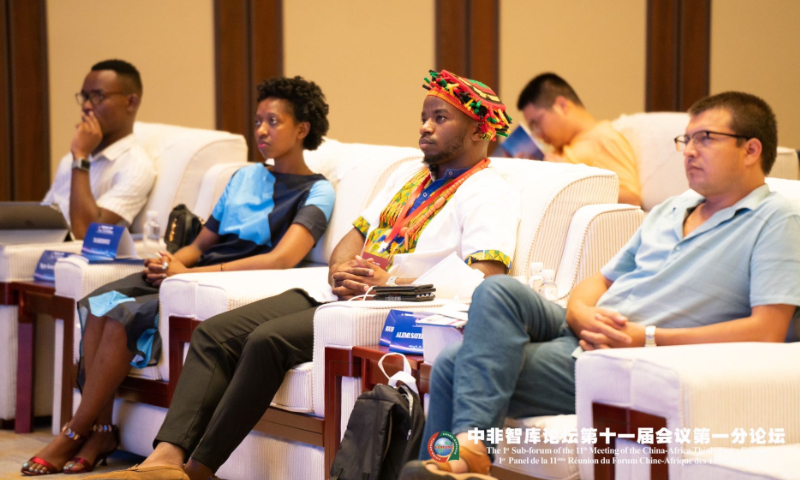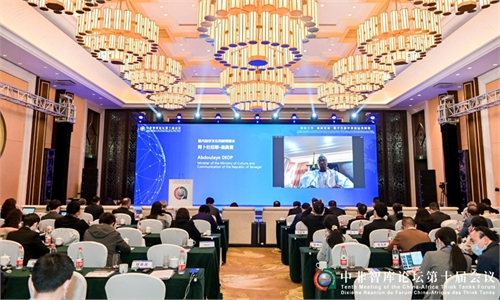11th China-Africa Think Tanks Forum promotes spirit of China-Africa friendship and cooperation

Attendants participate in the event at the sub-forum organized by the Institute of African Studies of Zhejiang Normal University held in Zhejiang's Jinhua on Thursday. Photo: Courtesy of Zhejiang Normal University
The 11th Meeting of the China-Africa Think Tanks Forum was held on Wednesday and Thursday in Beijing and Jinhua, East China's Zhejiang Province, with more than 200 officials, scholars and other attendants from China and 19 African countries and regions participating in the events online and on-site to enhance the deep understanding between the two sides.
With the theme of "Promoting the Spirit of China-Africa Friendship and Cooperation with Joint Action on the Global Development Initiative," the two-day meeting initiated discussions on the perspectives of building a high-quality China-proposed Belt and Road Initiative (BRI), the Global Development Initiative and the African Union's Agenda 2063, the promotion of the implementation of the Global Development Initiative in Africa, as well strengthening people-to-people exchanges and cooperation.
China's Vice Foreign Minister, Deng Li, said in his speech at the opening ceremony on Wednesday that the BRI, the Global Development Initiative and the Forum on China-Africa Cooperation (FOCAC) are China's response on contribution to the global development, according to China's Ministry of Foreign Affairs on Thursday.
The conference included three sub-forums which were organized by the Institute of African Studies of Zhejiang Normal University, the China-Africa Institute and the Centre for African Studies of Peking University.
A sub-forum organized by the Institute of African Studies of Zhejiang Normal University was held in Zhejiang's Jinhua on Thursday with the theme "Belt and Road Initiative and China-Africa Cooperation on Financing for Development." Officials, scholars, journalists and business representatives from China and six African countries, including South Africa, Mali, Senegal, Nigeria, Tanzania and Guinea-Bissau, attended the event both online and on-site.
The representatives included Moussa Mara, former prime minister of Mali, Christine Musisi, Resident Representative of the UNDP Tanzania and Antonio Serifo Embalo, Ambassador of Guinea-Bissau to China.
Total bilateral trade between China and African countries has reached over $250 billion with Africa's exports to China topping over $100 billion. The cooperation is not only important, but also mutually beneficial for both sides, Mara said at the opening speech on Thursday.
Gu Jianxin, director-general of the Department of Foreign Affairs of the Zhejiang Provincial People's Government, said on Thursday's sub-forum that Zhejiang has always kept a sound cooperation with African countries in trade and other sectors. Before the pandemic, nearly 5,000 people from Zhejiang traveled to Africa every year, according to Gu.
In the context of the BRI, it represents many opportunities and a range of different arrangements for future cooperation and this could greatly contribute to and support the African Union Agenda 2063 and address the continent's current enormous infrastructure and industrial development gaps, Gert Grobler, senior research fellow of the Institute of African Studies at Zhejiang Normal University said at the sub-forum.
The stories of China-Africa relations should be narrated by Chinese and Africans together, Yetunde Aina, CEO of Jadeas Trust, said during the event. Africa is facing many challenges including security, unemployment, currency devaluation and lack of funds for infrastructure and development projects. With the support of China and the international community, Africa is tackling these problems, Aina said.

Attendants at the sub-forum in Jinhua on Thursday Photo: Courtesy of Zhejiang Normal University
This year is the beginning of the implementation of the FOCAC outcomes as the two sides have overcome the adverse impact caused by the external economic situation and COVID-19, Deng said at the opening ceremony of the conference in Beijing on Wednesday.
In the first five months of this year, China's imports from Africa increased by nearly 20 percent year-on-year, according to Deng. There are many projects undergoing in an orderly manner such as the China-African joint center for demonstration and training of modern agricultural technology exchange.
In the near future, China and Africa will further improve the quality and efficiency of practical cooperation in an innovative way and allow more people to understand and support China-Africa friendship and cooperation, said Deng.
As one of the important sub-forums of the FOCAC, the China-Africa Think Tanks Forum has been committed to providing intellectual support for the development of China-Africa relations and cooperation in various fields, Deng said.
China has been Africa's leading trading partner for 12 consecutive years. According to the General Administration of Customs of China, the total bilateral trade between China and Africa in 2021 reached $254.3 billion, up 35.3 percent year-on-year. On that period, Africa exported goods worth $105.9 billion to China, up 43.7 percent year-on-year.
Officials and scholars from China and Africa expressed the desire to strengthen cooperation in various fields, including trade, the economy and entertainment.
The launch ceremony of the China-Africa Exchanges Museum was also held during the sub-forum in Jinhua. The museum will systematically present major historical events in the past 2,000 years of China-Africa relations, especially the diplomatic efforts made by China .
The China-Africa Think Tanks Forum, established by the Institute of African Studies at Zhejiang Normal University in 2011, is one of the important settings within the framework of the FOCAC. Ten conferences have been held in China, Ethiopia, South Africa, Senegal and other countries and regions successively, which have effectively promoted exchanges and communication between the two sides.
Zhejiang Normal University has become one of the most renowned academic centers of African studies in China and one of the important drivers for people-to-people exchanges with Africa, Zheng Mengzhuang, President of Zhejiang Normal University, said at the opening speech on Thursday.

